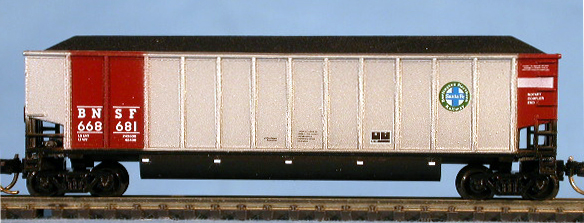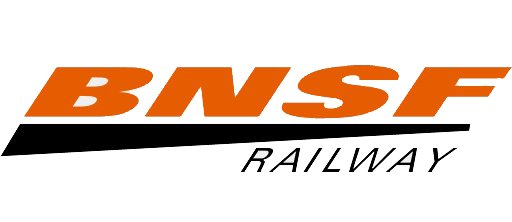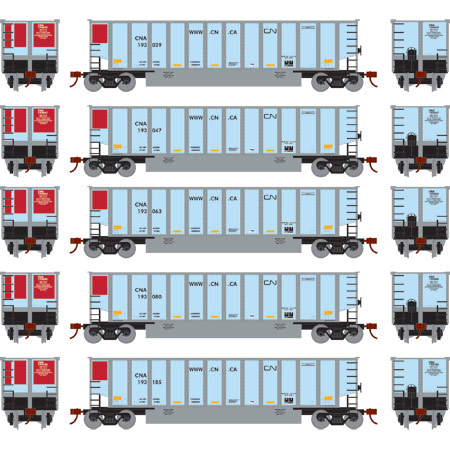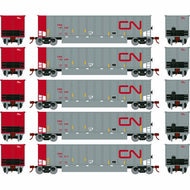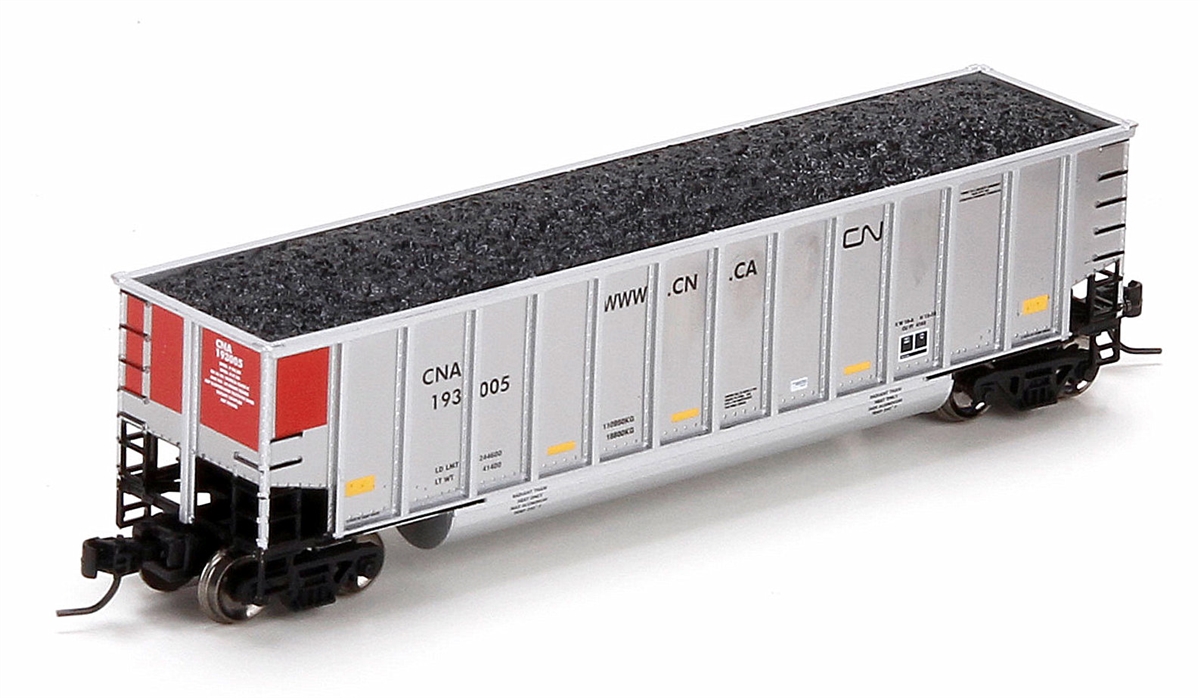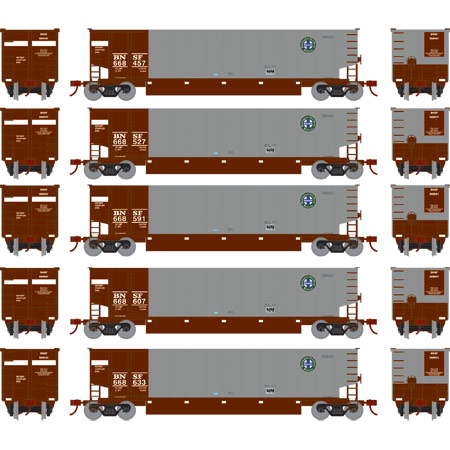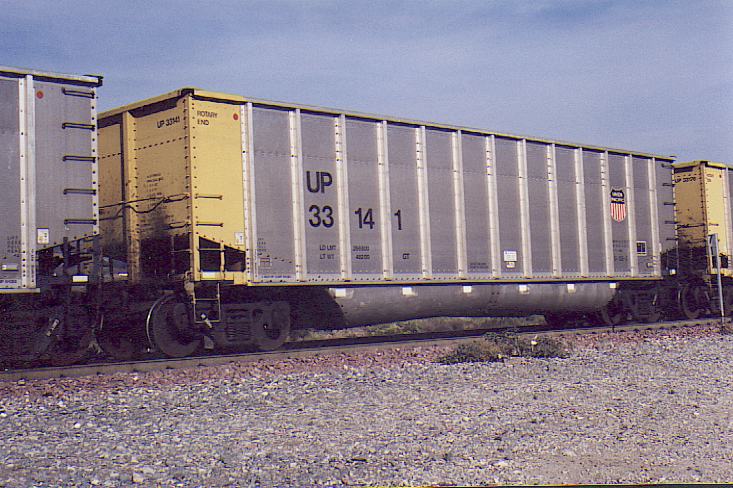Model Information: These models come with optional, user-installed weights and internal bracing.
Prototype History: There have been a number of designs of coal-hauling gondolas for todays operations. Most of the major builders have offered aluminum-bodied coal gons at one point or another. Bethlehem Steel Car made a significant introduction with its Bethgon design. This design continues with Johnstown America today. The basic design uses two longitudinal tubs between the trucks - thus adding additional cubic-foot capacity with a lower center of gravity.
In 1992, Trinity Industries introduced a similar design and called it the Aluminator. Six demonstrators were built and placed under Trinity Industries Leasing Company reporting marks (TIMX 1001-1006). This initial design was rated at a 4,400 cubic-foot capacity. Most new-built coal cars (hoppers and gondolas) are built to a standardized 53' 1" outside length. The Trinity Aluminator is no exception. The 4400 design has a 12' 7" extreme height (11' 6" inside height). What made the Aluminator unique was the way the bottom of the tubs slope down ward from the center to the ends (the Bethlehem/Johnstown design had straight bottom tubs). The body has 13 side posts each with an alternating rivet pattern. There are three internal cross braces (at the 4th, 7th and 10th side posts). Trinity's aluminum rotary dump gondola features twin longitudinal tubs located on either side of the steel center sill.
In 1992, Trinity Industries introduced a similar design and called it the Aluminator. Six demonstrators were built and placed under Trinity Industries Leasing Company reporting marks (TIMX 1001-1006). This initial design was rated at a 4,400 cubic-foot capacity. Most new-built coal cars (hoppers and gondolas) are built to a standardized 53' 1" outside length. The Trinity Aluminator is no exception. The 4400 design has a 12' 7" extreme height (11' 6" inside height). What made the Aluminator unique was the way the bottom of the tubs slope down ward from the center to the ends (the Bethlehem/Johnstown design had straight bottom tubs). The body has 13 side posts each with an alternating rivet pattern. There are three internal cross braces (at the 4th, 7th and 10th side posts). Trinity's aluminum rotary dump gondola features twin longitudinal tubs located on either side of the steel center sill.
Road Name History: The BNSF Railway (reporting mark BNSF) is one of the largest freight railroad networks in North America, second to the Union Pacific Railroad (UP) (its primary competitor for Western U.S. freight), and is one of seven North American Class I railroads. It has 48,000 employees, 32,500 miles (52,300 km) of track in 28 states, and over 8,000 locomotives. It has three transcontinental routes that provide high-speed links between the western and eastern United States. BNSF trains traveled over 169 million miles in 2010, more than any other North American railroad.[2] The BNSF and UP have a duopoly on all transcontinental freight rail lines in the Western U.S. and share trackage rights over thousands of miles of track.
According to corporate press releases, the BNSF Railway is among the top transporters of intermodal freight in North America. It also hauls bulk cargo. For instance, the railroad hauls enough coal to generate roughly ten percent of the electricity produced in the United States.
Headquartered in Fort Worth, Texas, the railroad is a wholly owned subsidiary of Berkshire Hathaway Inc.
The creation of BNSF started with the formation of a holding company, the Burlington Northern Santa Fe Corporation on September 22, 1995. This new holding company then purchased the Atchison, Topeka and Santa Fe Railway (often called the "Santa Fe") and Burlington Northern Railroad, and formally merged the railways into the Burlington Northern and Santa Fe Railway on December 31, 1996. On January 24, 2005, the railroad's name was officially changed to "BNSF Railway," using the initials of its original name.
In 1999, Burlington Northern Santa Fe and the Canadian National Railway announced their intention to merge and form a new corporation entitled North American Railways to be headquartered in Montreal, Canada. The United States' Surface Transportation Board (STB) placed a 15-month moratorium on all rail mergers, which ended this merger.
On November 3, 2009, Warren Buffett's Berkshire Hathaway announced it would acquire the remaining 77.4 percent of BNSF it did not already own for $100 per share in cash and stock - a deal valued at $44 billion. The company is investing an estimated $34 billion in BNSF and acquiring $10 billion in debt. On February 12, 2010, shareholders of Burlington Northern Santa Fe Corporation voted in favor of the acquisition.
According to corporate press releases, the BNSF Railway is among the top transporters of intermodal freight in North America. It also hauls bulk cargo. For instance, the railroad hauls enough coal to generate roughly ten percent of the electricity produced in the United States.
Headquartered in Fort Worth, Texas, the railroad is a wholly owned subsidiary of Berkshire Hathaway Inc.
The creation of BNSF started with the formation of a holding company, the Burlington Northern Santa Fe Corporation on September 22, 1995. This new holding company then purchased the Atchison, Topeka and Santa Fe Railway (often called the "Santa Fe") and Burlington Northern Railroad, and formally merged the railways into the Burlington Northern and Santa Fe Railway on December 31, 1996. On January 24, 2005, the railroad's name was officially changed to "BNSF Railway," using the initials of its original name.
In 1999, Burlington Northern Santa Fe and the Canadian National Railway announced their intention to merge and form a new corporation entitled North American Railways to be headquartered in Montreal, Canada. The United States' Surface Transportation Board (STB) placed a 15-month moratorium on all rail mergers, which ended this merger.
On November 3, 2009, Warren Buffett's Berkshire Hathaway announced it would acquire the remaining 77.4 percent of BNSF it did not already own for $100 per share in cash and stock - a deal valued at $44 billion. The company is investing an estimated $34 billion in BNSF and acquiring $10 billion in debt. On February 12, 2010, shareholders of Burlington Northern Santa Fe Corporation voted in favor of the acquisition.
Brand/Importer Information:  The LBF company was based in Roseburg Oregon founded by Fred Becker. LBF was the successor company to E&C Shops, also founded by Becker. LBF also did business under the name USA Plastics. USA Plastics/LBF opened for business in 1993. They produced N Scale models using toolings purchased from the E&C Company. Later, in 1998, LBF folded and the toolings were sold to Hubert's Model RR Manufacturing group which was also located in Roseburg. Hubert had been one of Becker's partners in LBF/USA Plastics. Later, when Hubert's operation folded, the toolings were acquired by InterMountain.
The LBF company was based in Roseburg Oregon founded by Fred Becker. LBF was the successor company to E&C Shops, also founded by Becker. LBF also did business under the name USA Plastics. USA Plastics/LBF opened for business in 1993. They produced N Scale models using toolings purchased from the E&C Company. Later, in 1998, LBF folded and the toolings were sold to Hubert's Model RR Manufacturing group which was also located in Roseburg. Hubert had been one of Becker's partners in LBF/USA Plastics. Later, when Hubert's operation folded, the toolings were acquired by InterMountain.

Item created by: CNW400 on 2020-11-21 12:36:59. Last edited by CNW400 on 2020-11-21 12:37:00
If you see errors or missing data in this entry, please feel free to log in and edit it. Anyone with a Gmail account can log in instantly.
If you see errors or missing data in this entry, please feel free to log in and edit it. Anyone with a Gmail account can log in instantly.


